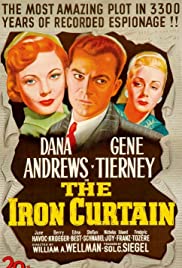
THE IRON CURTAIN
US, 1948, 88 minutes, Black and white.
Dayna Andrews, Gene Tierney, June Havoc, Berry Kroeger, Stefan Schnabel, Eduard Franz.
Directed by William A. Wellman.
In 1948 when this film was released, The Iron Curtain was a new phrase, instigated by Winston Churchill, the separation of the West from the Soviet Union, allies during World War II. It was said that an Iron Curtain had come down to cut Europe in half. This was the Stalinist era.
This film is in a rather documentary style, very popular at this period with films like Call Northside 777. The film is sharp, a documentary like voice-over commenting on characters and situations as well as giving a moral perspective.
This film is based on an actual story, of one of the members of the Russian Embassy in Ottawa coming during the war, very loyal to the authorities, subscribing to the fact that the authorities thought best and should be obeyed, but having a child, wondering about the future, seeing some of the disillusionment in other members of the embassy, he plans to take documents and secede to the west. This actually proves rather difficult as government authorities are wary, wondering about his authenticity, and the newspapers wary and not wanting to handle such difficult material. Eventually, while embassy staff complained about the stealth of documents, the local police quoted rules to hang on to them, enabling the escape of the man and his wife.
Dana Andrews, a reliable lead at this time of his career, a strong presence in 20th Century Fox films, is the Russian who defects. Gene Tierney, with whom Andrews had appeared in Laura, is his wife. June havoc is one of the staff in Ottawa.
The film was photographed in Ottawa in authentic locations. Interesting at the time, anticipating the many defections both from the Soviet Union as well as to the Soviet Union, the film is interesting to look back in retrospect to gain something of the atmosphere of the period.
Direction is by William A. Wellman, director of the first Oscar-winning film, Wings, as well as a number of films with flying subjects, but also a range of significant dramas from the 1920s to the 1950s.
1. A film of 1948? Its perspective on Communism? The effect of the film? The war situation, post-war? Communism, the Soviet Union? Espionage? Nuclear issues?
2. The film in retrospect? The history of communism, of the Soviet Union and its collapse? The role of the United States and the Western world? The reality of the Iron Curtain?
3. The use of real Canadian locations, the city of Ottawa? Offices, apartments, the streets? Interiors? The creation of atmosphere? Black-and-white photography? The musical score?
4. The voice-over, the documentary tone and style?
5. The situation in Canada, allies in the war? Russia? The creation of Communist cells, the history of communism in the Americas prior to the war? Infiltration, ideology, socialism? Perspectives on society? Russia in the 1920s onward, the Stalinist era, spies? The personnel, the fifth column, in politics, the military, scientists, in society?
6. Igor, his training, his job in Canada, eager arrival, the briefing with the authorities, keeping secret his identity and training? The area for work, the guard, continual playing music to disguise voices? The documents? Preparing messages and Communications? Nina, the place in the office, outing, seduction, Igor seeing it as a test? His relationship with the authorities? The general, his sense of failure, his drinking? Preparation for Igor’s wife and arrival, the apartment?
7. Igor as a rigid character? Loyalties, critiques of the West, belief that the authorities knew what was right? His wife’s arrival, joy, her pregnancy, his suspicions of the helpful neighbour? Her ordinary life in the apartment, her liking it so much? So different from Russia?
8. The infiltration into politics, Canadian government, the various meetings, the personalities, the discussions about socialism? The scientist and his work and nuclear experiments? The politicians and their personalities, control? Potential for blackmail?
9. Igor, the questions from his wife, the seeding of doubts, the future of their child, what kind of society? The drunken officer, memories of his father, his father’s current doubletalk, the drinking, not caring anymore? The return to Russia?
10. Igor and his plan, getting documents to take with him, the secrecy, his wife and her understanding? With the baby?
11. Igor trying to reveal the truth? Going to the government officials, their not believing him, some considering him a crank? The idea going to the newspapers, the material too difficult for them to publish? The Russians and the reaction, his substitute, the officials going to the apartment, the police being called, the stand-off, the timing, the issue of documents and the police holding them, Igor and his wife protected but living in secret?
12. The consequences of the revelations, the arrests, the trials and the sentences?
13. The story of defectors during this Communist era? To the west? To the Soviet Union? Their experiences, in hiding?